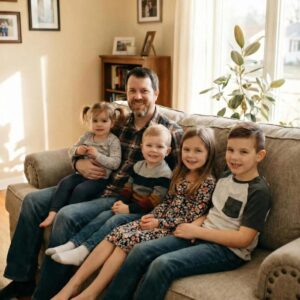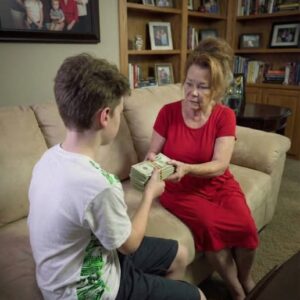Donald Harper never expected life to unravel so quickly. One moment, he was running to the supermarket for his usual groceries. The next, he stood in disbelief as firefighters battled the blaze consuming his home. The house he had built with his late wife—the one where his son Peter grew up—was reduced to ashes. The shock was so great that Donald collapsed from a heart attack right there on the street.
When he recovered in the hospital, Peter insisted that he move in with him and his wife Sandra. Donald resisted at first, not wanting to intrude on their lives. But Peter wouldn’t hear of it. They had three children who adored their grandfather, and they promised it would be good for everyone.
At first, it seemed to work. Donald told stories at bedtime, helped with homework, and kept the little ones laughing while their parents juggled work. But in the quiet hours after dinner, a nagging thought returned: he might be a burden. Their neighbor Mary, who often joined him for tea on the porch, reinforced that fear. She told him that grown children were too polite to admit when an elderly parent became inconvenient. She even shared her own story of how her daughter resented her during a short stay. The words took root in Donald’s heart, and soon, he noticed signs everywhere. Peter and Sandra were coming home later each night, looking exhausted. Donald interpreted their tired smiles as masks hiding irritation.
He began searching online for nursing homes, convincing himself that leaving would save his relationship with Peter. When he finally brought it up, Peter brushed the conversation aside, but months later, Donald raised it again with printed brochures in hand. This time, Peter agreed to drive him to a facility the next morning.
On the drive, Donald rehearsed what he’d say, clutching the paperwork tightly. When Peter pulled onto a familiar street, Donald frowned. “Are you sure this is the right way? Feels like we’re heading back to your house,” he said.
Peter only smiled. “We need to pick something up first.”
Donald kept reading the brochures, not paying much attention until the car slowed. Expecting to see a store, he looked up—and froze. They were parked in front of his old house. The house that had been reduced to blackened rubble was now standing tall, freshly rebuilt and gleaming in the morning sun.
His throat tightened. “No, you didn’t,” he whispered.
Peter’s eyes filled with pride. “Of course we did. Sandra and I worked every night to make this happen. We found contractors, stretched every dollar, and made sure everything was right. Dad, we couldn’t let you live in a nursing home. This house is part of us, too. It’s where you and Mom raised me. It’s your home—and always will be.”
Tears blurred Donald’s vision as he tried to protest. “That’s too much money. Let me pay you back.”
“Absolutely not,” Peter said firmly. “This isn’t about money. It’s about love. You were there for me every day growing up. You taught me everything I know. Now it’s my turn to give back.”
Donald broke down, sobbing into his son’s shoulder. For weeks, he had believed he was a burden. Now, standing before the restored home of his memories, he realized he had never been a burden at all. His family’s late nights hadn’t been attempts to escape him—they had been sacrifices made for him.
As they walked through the house together, Donald felt a peace he hadn’t known in months. The walls were new, the furniture modern, but the warmth was the same. He silently vowed never again to let fear or outside voices convince him that love could be a burden.




